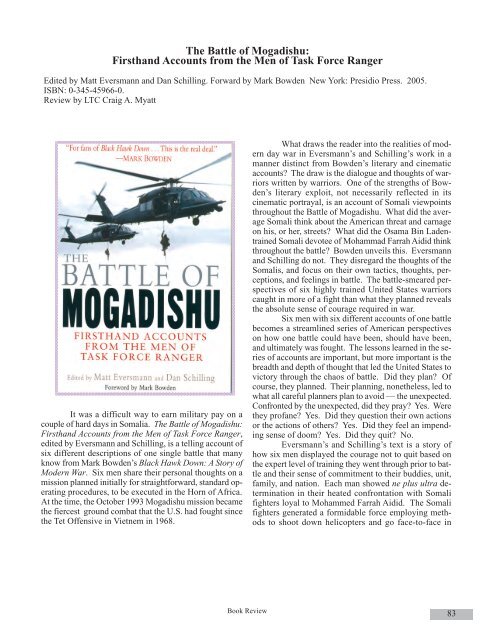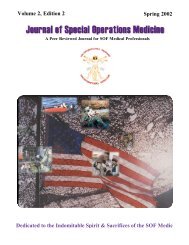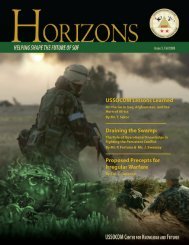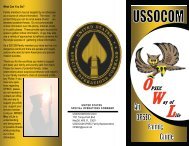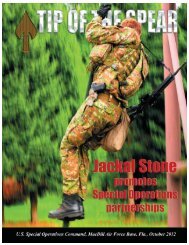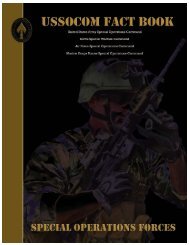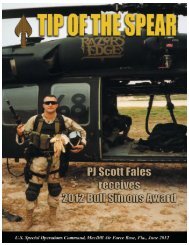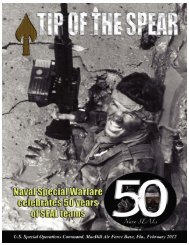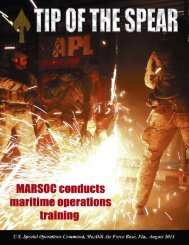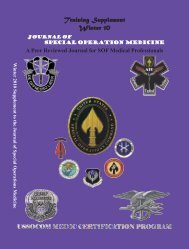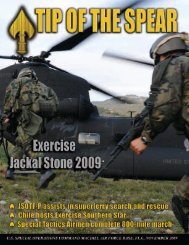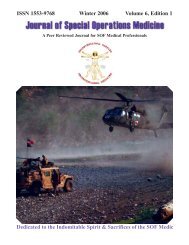on, of their own accord, the task to build this force. Thebook shows the difficulty that they encountered at everystep, and in every sense. Their frustration was apparent,even in the initial screening of the varied groups of Filipinos.Some were ready to fight, but many wanted tojust sit by and watch and remain uncommitted to eitherside. The uncommitted ones became known as the“fence-sitters.” Next, and most importantly, the bookbrings out the importance for them to meld with and gainthe Filipinos’ trust. Although extremely difficult, Blackburnemployed local tribes to include Ilocano and Fuegonative headhunters to create the bulk of his guerilla army,hence the name “Blackburn’s Headhunters.” The successof the native forces, along with his own survival,was in direct proportion to the degree that he integratedand empowered them.Throughout the book, Blackburn’s accountsshowed the brutal Japanese treatment of the Filipinoswho resisted, and often equally brutal treatment even tothose who did not resist. He described methods of torturethat without question equal and top the most heinous andevil anywhere, at any time. The fact that the guerillaforce kept going in the face of the risk of torture showedthe level of trust that Blackburn had earned. Blackburn’seffectiveness, integrity, and leadership grew throughoutthe continued training and employment of the nativeguerilla army.The medical significance of this book is minimal.There were plenty of medical issues and concernsin the Philippines during WW II, but most of the medicalchallenges and issues have been better documentedand written about elsewhere. In short, there was practicallyno medical capability present in the PhilippineArmy, and the U.S. Army medical capability was verylimited outside of the major cities and few major militarybases. Among the biggest medical problem in thePhilippines was dysentery. It ran rampant in many areasof the Philippines – especially in the central jungle areas,which was where Blackburn spent most of his time traininghis force. The author also refers often to the manyother intestinal tract diseases and parasites that produceda drain on his men, to include nausea, diarrhea, fever, anddehydration. Mosquitoes and leeches added significantlyto infection, malaria, fever, and general extreme discomfort.Quinine, if they could get it, was referenced as thecure for just about everything. According to Blackburn,it helped some, but nowhere near enough.The SOF significance of Don Blackburn is extensive.Throughout Don Blackburn’s career he continuedto contribute and build on the lessons andaccomplishments from the Philippines. Shortly after hissuccessful tour in the Philippines, Blackburn was assignedto Military Advisory Group – South Vietnam anddid a great deal of work with the South Vietnamese Armyin the Mekong Delta area. Shortly afterward, COLBlackburn was given command of the 77th <strong>Special</strong>Forces Group (soon to become 7th <strong>Special</strong> Forces Group)at Fort Bragg, NC, where he immediately establishedtraining designed to enable his ODAs to provide infantrytraining to foreign indigenous personnel. COL Blackburnwas responsible for sending the first group of ODAsinto Laos, under the famed LTC Arthur D. “Bull” Simons,to assist the Laotian Government in training theirArmy. This program became an in country preparationfor <strong>Special</strong> Forces deploying to Southeast Asia and amodel for the training program given to the Army of theRepublic of Vietnam (ARVN).After his command of the 77th SFG (A), Blackburnwas instrumental in growing <strong>Special</strong> Forces and infurther developing their employment and training. Heworked closely with famed BG William Yarborough atthe <strong>Special</strong> Warfare Center and was significant in furtherimproving failed intelligence operations in Vietnam. Outof Blackburn’s increased efforts in Vietnam came the developmentof the critically needed Military Assistance<strong>Command</strong> Vietnam – Studies and Observations Group(MACV-SOG), of which Blackburn became the secondcommander. The intelligence benefits of MACV-SOGwere critical to the successes in Vietnam – when theywere acted upon. COL Blackburn was soon appointedto BG and was the designer and recruiter for the famousSon Tay Prison Raid in which COL Bull Simons led theforces into the compound to rescue 70 American prisonersheld hostage. BG Blackburn continued to contributeto the empowerment of <strong>Special</strong> Forces at the highest levelsof the DOD and he is considered to be one of thefounders, if not “the” founder, of Army <strong>Special</strong> Forcestoday. His experience bears relevance also to theongoing missions of today.BG (Retired) Blackburn passed away in 2008 inhis home in Sarasota, Florida. He epitomized contributionand service and made an enormous difference forboth <strong>Special</strong> Forces and for this country overall. He isgreatly missed but his spirit lives on in <strong>Special</strong> Forces.See also:http://www.arlingtoncemetery.net/ddblackburn.htm82Journal of <strong>Special</strong> <strong>Operations</strong> Medicine Volume 9, Edition 3 / <strong>Summer</strong> 09
The Battle of Mogadishu:Firsthand Accounts from the Men of Task Force RangerEdited by Matt Eversmann and Dan Schilling. Forward by Mark Bowden New York: Presidio Press. 2005.ISBN: 0-345-45966-0.Review by LTC Craig A. MyattIt was a difficult way to earn military pay on acouple of hard days in Somalia. The Battle of Mogadishu:Firsthand Accounts from the Men of Task Force Ranger,edited by Eversmann and Schilling, is a telling account ofsix different descriptions of one single battle that manyknow from Mark Bowden’s Black Hawk Down: A Story ofModern War. Six men share their personal thoughts on amission planned initially for straightforward, standard operatingprocedures, to be executed in the Horn of Africa.At the time, the October 1993 Mogadishu mission becamethe fiercest ground combat that the U.S. had fought sincethe Tet Offensive in Vietnem in 1968.What draws the reader into the realities of modernday war in Eversmann’s and Schilling’s work in amanner distinct from Bowden’s literary and cinematicaccounts? The draw is the dialogue and thoughts of warriorswritten by warriors. One of the strengths of Bowden’sliterary exploit, not necessarily reflected in itscinematic portrayal, is an account of Somali viewpointsthroughout the Battle of Mogadishu. What did the averageSomali think about the American threat and carnageon his, or her, streets? What did the Osama Bin LadentrainedSomali devotee of Mohammad Farrah Aidid thinkthroughout the battle? Bowden unveils this. Eversmannand Schilling do not. They disregard the thoughts of theSomalis, and focus on their own tactics, thoughts, perceptions,and feelings in battle. The battle-smeared perspectivesof six highly trained <strong>United</strong> <strong>States</strong> warriorscaught in more of a fight than what they planned revealsthe absolute sense of courage required in war.Six men with six different accounts of one battlebecomes a streamlined series of American perspectiveson how one battle could have been, should have been,and ultimately was fought. The lessons learned in the seriesof accounts are important, but more important is thebreadth and depth of thought that led the <strong>United</strong> <strong>States</strong> tovictory through the chaos of battle. Did they plan? Ofcourse, they planned. Their planning, nonetheless, led towhat all careful planners plan to avoid — the unexpected.Confronted by the unexpected, did they pray? Yes. Werethey profane? Yes. Did they question their own actionsor the actions of others? Yes. Did they feel an impendingsense of doom? Yes. Did they quit? No.Eversmann’s and Schilling’s text is a story ofhow six men displayed the courage not to quit based onthe expert level of training they went through prior to battleand their sense of commitment to their buddies, unit,family, and nation. Each man showed ne plus ultra determinationin their heated confrontation with Somalifighters loyal to Mohammed Farrah Aidid. The Somalifighters generated a formidable force employing methodsto shoot down helicopters and go face-to-face inBook Review 83
- Page 1 and 2:
Volume 9, Edition 3 / Summer 09 Jou
- Page 3 and 4:
An 18D deworms a camel during a “
- Page 5 and 6:
Field Evaluation and Management of
- Page 7 and 8:
The circumferential anchoring strip
- Page 9 and 10:
In doing so, all the skin is closed
- Page 11 and 12:
NATO SOF Transformation and theDeve
- Page 13 and 14:
current and future operations, thes
- Page 15 and 16:
sion of a physician, and limited pr
- Page 17 and 18:
REFERENCES1. James L. Jones, “A b
- Page 19 and 20:
This article is the first of two me
- Page 21 and 22:
Figure 4 : A Special Forces medic c
- Page 23 and 24:
exposure. Conversely, the customary
- Page 25 and 26:
7. Ted Westmoreland. (2006). Attrib
- Page 27 and 28:
first three days of injury, althoug
- Page 29 and 30:
9. Markgraf CG, Clifton GL, Moody M
- Page 31 and 32:
the only sign of OCS may be elevate
- Page 33 and 34:
E. The canthotomy allows for additi
- Page 35 and 36: 33. Rosdeutscher, J.D. and Stradelm
- Page 37 and 38: Tinnitus, a Military Epidemic:Is Hy
- Page 39 and 40: The development of chronic NIHL pro
- Page 41 and 42: supplied by diffusion. During expos
- Page 43 and 44: similar to those of other authors,
- Page 45 and 46: promising effect on tinnitus. Howev
- Page 47 and 48: ADDITIONAL REFERENCESHoffmann, G; B
- Page 49 and 50: et al. demonstrated that both right
- Page 51 and 52: TYPICAL CHEST RADIOGRAPH FINDINGS I
- Page 53 and 54: 11. Norsk P, Bonde-Petersen F, Warb
- Page 55 and 56: ABSTRACTS FROM CURRENT LITERATUREMa
- Page 57 and 58: tourniquet times are less than 6 ho
- Page 59 and 60: tal from July 1999 to June 2002. In
- Page 61 and 62: Operation Sadbhavana: Winning Heart
- Page 63 and 64: CENTRAL RETINAL VEIN OCCLUSION IN A
- Page 65 and 66: of the X chromosome. Notable is tha
- Page 67 and 68: AUTHORS*75th Ranger Regiment6420 Da
- Page 69 and 70: Casualties presenting in overt shoc
- Page 71 and 72: PSYCHOLOGICAL RESILIENCE AND POSTDE
- Page 73 and 74: spondents without PTSD (M = 4.6, SD
- Page 75 and 76: patients, whereas the mean score of
- Page 77 and 78: 29. Whealin JM, Ruzek JI, Southwick
- Page 79 and 80: average, time between return from d
- Page 81 and 82: ing functioning in both PTSD (Zatzi
- Page 83 and 84: Editorial Comment on “Psychologic
- Page 85: Blackburn’s HeadhuntersPhilip Har
- Page 89 and 90: Task Force Ranger encountered enemy
- Page 91 and 92: Peter J. Benson, MDCOL, USACommand
- Page 93 and 94: Numerous military and civilian gove
- Page 95 and 96: Anthony M. Griffay, MDCAPT, USNComm
- Page 97 and 98: This is a great read that speaks di
- Page 99 and 100: and twenty-eight. Rabies immune glo
- Page 101 and 102: Rhett Wallace MD FAAFPLTC MC SFS DM
- Page 103 and 104: LTC Craig A. Myatt, Ph.D., HQ USSOC
- Page 105 and 106: LTC Bill Bosworth, DVM, USSOCOM Vet
- Page 107 and 108: Europe, Mideast, Africa and SWAU.S.
- Page 109 and 110: SOF and SOF Medicine Book ListWe ha
- Page 111 and 112: TITLE AUTHOR ISBNCohesion, the Key
- Page 113 and 114: TITLE AUTHOR ISBNI Acted from Princ
- Page 115 and 116: TITLE AUTHOR ISBNRats, Lice, & Hist
- Page 117 and 118: TITLE AUTHOR ISBNThe Healer’s Roa
- Page 119 and 120: TITLE AUTHOR ISBNGuerilla warfare N
- Page 121 and 122: TITLEAUTHORBlack Eagles(Fiction)Bla
- Page 123 and 124: TITLE(Good section on Merrill’s M
- Page 125 and 126: GENERAL REFERENCESALERTS & THREATSB
- Page 127 and 128: Aviation Medicine Resources: http:/
- Page 129 and 130: LABORATORYClinical Lab Science Reso
- Page 131 and 132: A 11 year old boy whose tibia conti
- Page 133 and 134: Meet Your JSOM StaffEXECUTIVE EDITO
- Page 135 and 136: Special Forces Aidman's PledgeAs a


